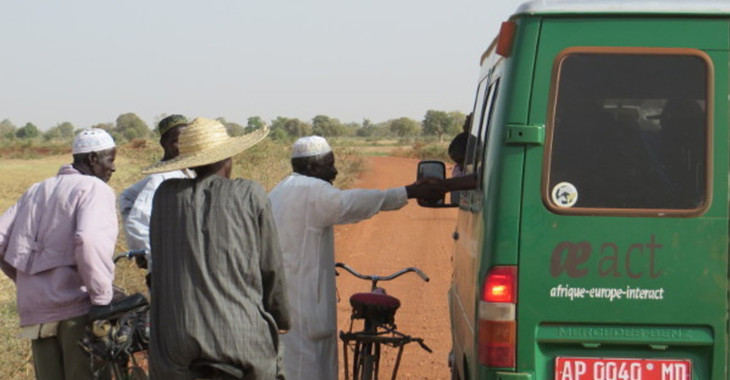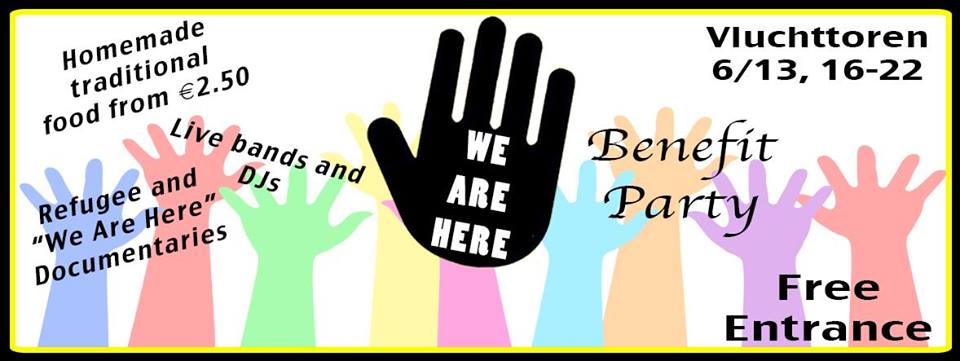http://alarmphone.org/en/2015/10/12/anniversary-statement/
(also in other languages available on the website)
[english underneath]
12.10.2015
‘Hoewel wij geconfronteerd worden met veel wanhoop, worden we ook eindeloos geïnspireerd door de kracht en moed om de zee te overwinnen en op zoek te gaan naar een nieuwe thuisplek in Europa’.
De grote sociale en politieke strijd die vluchtelingen en migranten leveren voor vrijheid van beweging wordt afgelopen paar maanden sterker, harder en meer zichtbaar. Een van de gevaarlijkste delen van de reis naar Europa is de oversteek per boot, waar migranten vaak als vee op elkaar gedrukt worden. Veiligere landroutes om Europa binnen te komen worden door Europese regeringsleiders afgesloten door legale- of fysieke middelen als grensmuren.
De Alarm Telefoon staat sinds april roodgloeiend. We worden iedere dag gebeld door mensen in nood op zee, of hun bezorgde families of vrienden. Ons doel is ervoor zorgen dat hun noodkreet gehoord wordt en hier meteen een reddingsactie aan gekoppeld wordt. In het centrum en het westen van de Middellandse zee, alsmede in de Egeïsche zee, zijn wij betrokken bij honderden noodsituaties en hebben hier ernstige mensenrechtenschendingen gedocumenteerd.
Op 11 oktober 2015 is de Alarm Telefoon één jaar oud. Wij hebben deze datum bewust gekozen, aangezien op deze datum een schip is gezonken met als gevolg meer dan 200 doden. De slechte staat van het schip was bekend, maar de Maltese en Italiaanse autoriteiten waren niet bereid om snel in actie te komen voor 400 mensen in nood op zee. Destijds vroegen wij ons af wat er gebeurd zou zijn met de mensen op dit zinkende schip, als er een onafhankelijke tweede telefoonlijn had bestaan. Een telefoonlijn waaraan een burger team gekoppeld was, die direct klaarstonden om alarm te slaan en druk uit te oefenen op de autoriteiten om een reddingsmissie te starten. Een jaar later hebben wij de Alarm Telefoon opgezet: een meldpunt voor mensen in nood, die de maritieme grens proberen over te steken.
Wij konden niet langer toekijken hoe steeds meer wreedheden zich voor onze ogen afspeelden en wilden niet beperkt blijven tot het achteraf veroordelen van de verantwoordelijke autoriteiten. Wij ondernemen actie, in de meest dodelijke grenszone van de wereld en zetten een telefoonlijn op die 24-uur per dag beschikbaar is. Deze lijn wordt gerund door een internationaal netwerk van activisten en migranten groepen aan beide kanten van de Middellandse zee. Hoewel het voor ons niet mogelijk is om fysiek aanwezig te zijn met een reddingschip, bieden we advies en slaan alarm wanneer mensen in nood niet geholpen- of zelfs terug geduwd worden door de Europese grenswachters.
In het afgelopen jaar is ons netwerk van activisten gegroeid tot meer dan 100 mensen in verschillende steden en landen. We worden gesteund door verschillende migrantgroepen, individuele leden en mensenrechtenactivisten en -organisaties. Ook werken we samen met deze organisaties en groepen, om migranten en vluchtelingen te steunen in hun reis door- en buiten Europa. Wij hebben ontzettend veel geleerd van dit proces met jullie. Zeker onze jonge Syrische vrienden zijn van onschatbare waarde. Zij ondersteunen iedere nacht weer reizigers die de Middellandse zee oversteken en informeren ons wanneer er zich problemen voordoen.
Toen we de Alarm Telefoon oprichtten, hadden wij de huidige migratie crisis van 2015 niet voorzien. De situatie aan de grenzen van Europa is onhandelbaar. Meer dan een half miljoen mensen gaat de Europese watergrens over, volgens tellingen tot eind september. Hiervan zijn meer dan 3000 mensen vermist, verdronken en gestorven.
Binnen één week, medio april, zijn meer dan 1200 mensen gestorven in schipwrakken aan de kust van Libië in de Middellandse zee. Deze doden zijn directe gevolgen van Europa’s gebrek aan motivatie om een adequaat, grootschalig reddingsplan op te stellen voor personen die de watergrens proberen over te steken. Als reactie op dit drama heeft de Europese Unie geen maatregelen genomen om toekomstige overstekers te helpen, maar heeft haar afschrikbeleid verder uitgebreid. Er is een anti-smokkelaar campagne campagne; EUNAFOR Med. gelanceerd en het budget voor Europa’s grensbewaking operatie; Triton, uitgevoerd door de organisatie Frontex, is verdriedubbeld. Diverse door burgers gestuurde schepen, zoals die van Artsen zonder Grenzen, MOAS en Sea-Watch, voeren om dit gat in hulpverlening te vullen zelf reddingsoperaties uit op zee. Zij hebben al duizenden levens gered.
De Egeïsche zeeroute is momenteel de meest gebruikte route naar Europa. In de zomermaanden zijn steeds meer mensen verdronken op dit traject. Ondanks te korte afstand tussen Turkije en Griekenland over zee, kan de reis levensgevaarlijk zijn door de flinke stromingen en windstoten. Om hier nog een schepje bovenop te doen, hebben wij verschillende keren meegemaakt hoe gemaskerde grensbewakers boten met vluchtelingen aanvielen, bedreigden, hun motor stolen en zelfs in sommige gevallen de boten lek stoken. Toch komen er nog steeds dagelijks duizenden vluchtelingen aan op kleine Griekse eilandjes en nog nooit verliep de reis naar Europa zo snel.
De minst gebruikte zeeroute richting Europa loopt via Marokko naar Spanje. Ook hier worden duizenden doden gerapporteerd. De Marokkaanse marine onderbreekt de reis van veel bootvluchtelingen door ze op gewelddadige wijze terug te brengen naar de plek die ze probeerden te ontvluchtten.
Wij hebben honderden mensen in nood op zee geholpen. Wij lokaliseren schepen met behulp van GPS data. Wij krijgen informatie over de situatie van de boot en verlenen psychologische hulp. Tegelijkertijd slaan wij alarm bij de reddingsorganisatie en oefenden druk uit op de verantwoordelijke autoriteit om dit zo snel mogelijk te regelen. Hoewel we vaak met de hopeloosheid van de bootvluchtelingen geconfronteerd worden, worden we ook enorm geïnspireerd door de motivatie en kracht van deze mensen om de zee te trotseren en alsnog in Europa op zoek te gaan naar een nieuw thuis.
In afgelopen zomer is de migratie naar Europa niet afgenomen. De huidige migratiecrisis gaat nu al de geschiedenisboeken in als de grootste crisis aan de grenzen van Europa, door de honderdduizenden mensen die hier nu een veilige haven proberen te vinden. Terwijl Europa’s afschrikbeleid de reis naar Europa tot een levensgevaarlijke onderneming maakt, maken deze mensen simpelweg gebruik van hun recht op vrije mobiliteit. Zij blijven grens na grens overgaan op zoek naar een veilige haven. Hoewel verschillende Europese landen hun grenzen hebben versterkt middels extra regels, hekken, muren en grensbewaking; blijven er nieuwe wegen naar Europa ontstaan. Duizenden Europeanen heten de Europeanen in wording welkom. Zij strijden in solidariteit met de vluchtelingen en migranten voor een veilige grensovergang, goede opvang in Europa en basisrechten tegen deportatie en discriminatie.
De Alarm Telefoon is nu een jaar oud en wij hadden gehoopt te kunnen zeggen dat onze werkzaamheden niet langer meer nodig waren, omdat er genoeg veilige wegen naar Europa leidden. Helaas is dit niet het geval en dit doel lijkt niet in de nabije toekomst gerealiseerd te kunnen worden. In een tijd waarin Europese grensbewaking verscherpt, beloven wij door te strijden. Wij zijn een beweging die staat voor mondiale gelijkheid. Met dit gedachtengoed, vragen wij om ‘Ferries, not Frontex’ (veerboten in plaats van Frontex). Wij vragen om vrijheid van beweging voor iedereen, een veilige weg naar Europa en een warm welkom voor de mensen die hier aankomen.
contact & information:
wtm-alarm-phone@antira.info
Wij willen iedereen bedanken die meegewerkt heeft aan de Alarm Telefoon, op politiek en sociaal gebied, met hun handtekeningen en donaties. De volgende personen willen wij persoonlijk bedanken:
> De honderden bootvluchtelingen die ons gebeld hebben: jullie vertrouwen en moed heeft ons kracht gegeven. Jullie doorzettingsvermogen motiveert ons om hiermee door te gaan.
> Vader Mussie Zerai; het netwerk van Syrische activisten: Nawal Soufi en haar hele team; het Macedonische collectief en anderen die soortgelijke taken als wij uitvoeren. Jullie inspireren ons met jullie kennis en toewijding.
> De moedige vissers die al honderden mensen hebben gered in de Turkse en Griekse wateren; onze vrienden van Sea-Watch; de bemanning van Artsen zonder Grenzen en MOAS.
> Alle bemanning van cargo schepen die direct reageerden op onze SOS oproepen en geholpen heeft, zelfs zonder training en kennis van reddingsoperaties.
> Alle kustwachten die betrokken waren bij reddingsoperaties aan land en op zee. Jullie hebben alles gegeven om migranten en vluchtelingen te redden en zijn, in tegenstelling tot sommige van jullie collega’s, bezig met het redden van vluchtelingen in plaats van geweld aanjagen jegens deze mensen.
Ook willen wij onze vrienden bedanken, die hun ervaringen hebben gedeeld over hun zeetocht naar Europa. Jullie verhalen hebben een beter inzicht in de situatie op zee gecreëerd. Als laatste willen we de mensen bedanken die een steun en toeverlaat vormen voor onze teamleden. Jullie zijn een luisterend oor en een rots in de branding. Wij steken iedereen die staat voor de vrijheid van mobiliteit een hart onder de riem toe.
Tot slot zijn donaties voor dit project altijd welkom.
Forschungsgesellschaft Flucht & Migration
Sparkasse der Stadt Berlin
IBAN: DE68 10050000 0610024264
BIC: BELADEBEXXX
Catchword: WatchTheMed-AP
Contact information: wtm-alarm-phone(at)antira.info
[GB]
“While we are confronted with a lot of despair, we have also been inspired uncountable times by the willingness to overcome the sea and to move on to desired places throughout Europe”.
They grew stronger, louder and more visible every day in the past months: the incredible social and political struggles of refugees and migrants for the freedom of movement. To overcome the Mediterranean Sea in small and overcrowded boats is one of the most dangerous aspects of these migration journeys towards the European Union as safe and legal pathways are closed down and fenced off by its governments.
Especially since April this year, our Alarm Phone is called every day by people in distress at sea, or by their families, communities and friends. We try to ensure that their calls are being heard and that rescue operations are quickly being launched. In the Central and Western Mediterranean Sea as well as in the Aegean Sea, we have been engaged in hundreds of distress situations and have also documented grave human rights violations.
On the 11 of october 2015, the Alarm Phone turned one year old. We consciously chose that date last year to launch our project as it was the anniversary of a shipwreck that had caused the death of more than 200 people. The vessel’s precarious situation had been known, but the Maltese and Italian authorities were unwilling to rapidly respond to the distress of more than 400 people in the Central Mediterranean Sea. A year later we began to operate the so-called Alarm Phone, a hotline for people in distress at sea when trying to cross maritime borders. Back then we asked: What would have happened if the people could have directed a second call to an independent phone-hotline through which a team of civil society members could raise alarm and put immediate pressure on authorities to rescue?
We did not want to stand by any longer as more and more atrocities were unfolding before our eyes and we did not want to merely condemn responsible authorities in the aftermath of mass deaths. We decided to directly intervene in the most deadly borderzone of the world and created a phone line that is available 24/7 and run by a transnational network of activist and migrant groups, located in various settings on both sides of the Mediterranean Sea. While we are not able to physically intervene, with no rescue vessels at our disposal, we offer advice and raise alarm when people in immediate distress are not promptly rescued or even attacked and pushed-back by European border authorities.
In the past year, our network of activists has grown and we are now more than 100 people situated in various cities and countries. We gained the support of many migrant communities, individual members of civil society, as well as human rights activists and organisations. We now also cooperate with various activist collectives that support people on the move throughout and beyond Europe. We want to thank all of them, because we have learned so much in the process of engaging with you. We want to particularly thank our young Syrian friends who bravely support travellers on boats every night and inform us in cases of distress.
When we launched the Alarm Phone, we could not have imagined how dramatic the situation along Europe’s maritime borders would become in 2015, with more than half a million people able to cross them by the end of September and with, once again, more than 3000 people disappearing, drowning, and dying.
Within one single week in April, more than 1200 people died in shipwrecks in the Central Mediterranean Sea, off the coast of Libya. These deaths were the direct consequence of Europe’s unwillingness to create an adequate and large-scale rescue operation at sea. In the aftermath, the EU did not introduce measures to prevent the dying but extended its policies of deterrence by launching a military ‘anti-smuggler’ campaign called Eunavfor Med and by tripling the budget for the operation Triton of Europe’s border control agency Frontex. Various civilian humanitarian rescue vessels, such as those of MSF, MOAS and Sea-Watch, have tried to fill the void and have rescued thousands of lives.
In the summer months, more and more people drowned also in the Aegean Sea which has become the most frequented sea route into Europe. While the stretches between Turkey and Greece are short, the sea, its currents and strong winds turn journeys from time to time into incredibly dangerous endeavours. And, to make matters worse, we have witnessed several times how masked border units attacked refugee vessels, threatened their passengers, stole there engines and at times punctured their boats. Nevertheless, thousands continue to arrive daily on the small Greek islands and never was their movement towards their destination as fast as it is today.
The least frequented sea route currently is the one between Morocco and Spain but also there dozens of deaths were recorded. More often than not, the Moroccan Navy forcibly intercepted travellers on precarious vessels and returned them to the place they seek to escape.
In hundreds of distress situations we assisted people in urgent need. We were often able to locate their vessels through GPS data, obtain information about their emergency situation and give psychological assistance, to then alarm the responsible rescue services and make pressure so that they would intervene as quickly as possible. While we are confronted with a lot of despair and human suffering in moments of distress at sea which is not easy to deal with for our shift teams, we have also been inspired uncountable times by the willingness to struggle on, to overcome the sea, and then move to desired places throughout Europe.
This summer of migration has still not come to an end but what we have witnessed in the past months is truly historic already. The movement of hundreds of thousands of people provoked the biggest crisis of the European border regime up to date. While Europe’s policies of deterrence seek to turn journeys into struggles over life and death, these people simply enacted their freedom of movement by disobediently crossing one border after the other. While countries tried to resurrect their borders, positioned police and military forces along them, and built higher razor-wired fences, they failed to block these human mobilities. These travellers are Europe’s newest members and they will change and transform Europe forever. Thousands of European citizens have welcomed them and struggled in solidarity with them, for safe passage and arrival, for rights and accommodation, and against repression and deportation.
The Alarm Phone is now one year old and we wish we could say that our work is no longer needed as there now are safe ways of entry for those who are escaping for various reasons. While this is not in sight in the near future and the border regime seeks to find new ways to violently exclude people on the move, we promise to struggle on. We understand ourselves as a movement for global justice and informed by this perspective we call for ‘Ferries not Frontex’, the freedom of movement for all, safe pathways into Europe and a welcoming culture for those who newly arrive.
contact & information:
wtm-alarm-phone@antira.info
We would like to thank all those who supported the Alarm Phone during the past year politically and socially, with their signatures and donations. We would like to thank in particular:
– All the hundreds of refugees on boats who called us: your confidence and courage were gifts to us. It is your determination that animates us and allows us to struggle on.
– Father Mussie Zerai; all the networks of Syrian activists; Nawal Soufi and her whole team; the Macedonian collective and all others who do a similar job like us and inspired us with your knowledge and commitment.
– All the brave fisherman who saved hundreds of people in distress in Turkish and Greek waters; our friends from Sea-Watch; the crews of Médecins Sans Frontières and MOAS.
– All the crews of cargo vessels who did not hesitate to quickly react to SOS calls and helped, even if they were not equipped or trained to conduct rescue operations.
– All those coastguard members in rescue operation centres and those who went out to sea and gave their best to rescue migrants and refugees in distress and who, unlike some of their colleagues, were not involved in violent and inhumane practices, including non-rescue, push backs, attacks and interceptions.
We also thank all our friends who shared their own experiences of crossing the sea on boats with us: Exchanging with you gave us a much better understanding of the whole situation. And all of the uncountable friends who listen to our shift-team members when they need someone to speak to. All of you who struggle every day for the freedom of movement.
Last but not least, we are always happy to receive donations for our project.
Forschungsgesellschaft Flucht & Migration
Sparkasse der Stadt Berlin
IBAN: DE68 10050000 0610024264
BIC: BELADEBEXXX
Catchword: WatchTheMed-AP
Contact information: wtm-alarm-phone(at)antira.info
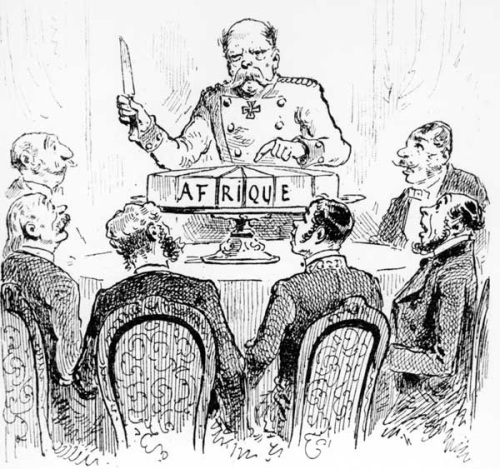

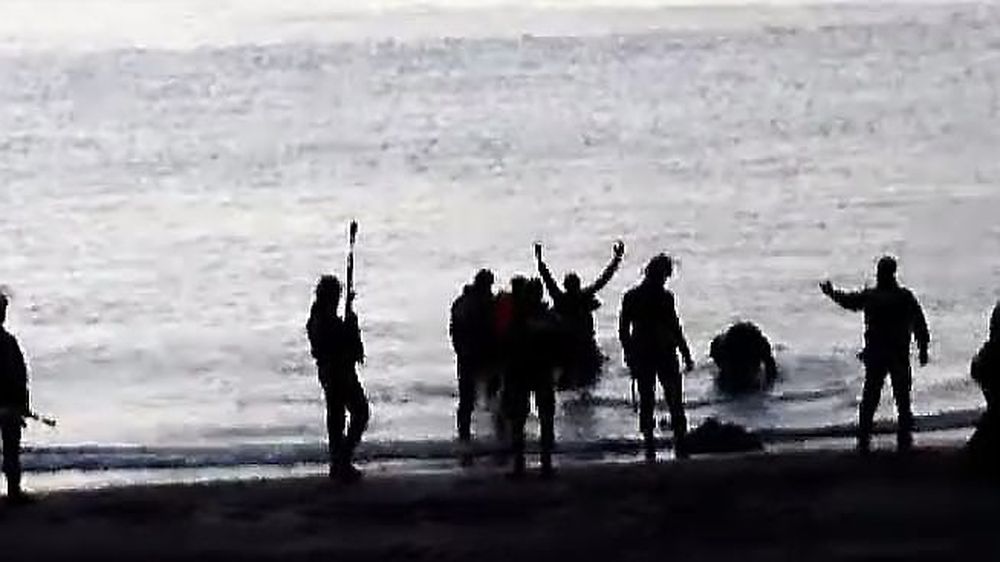
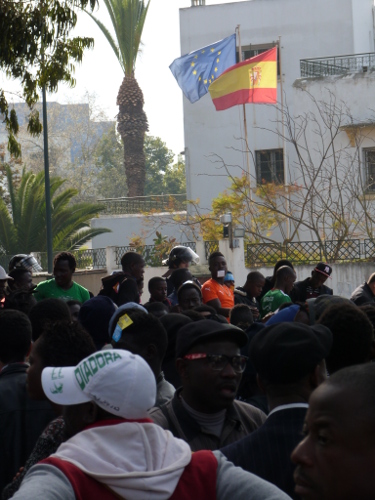
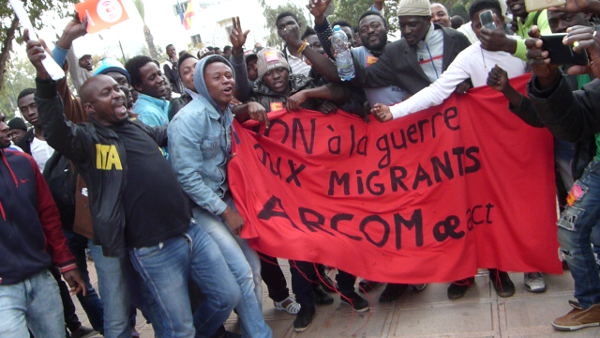
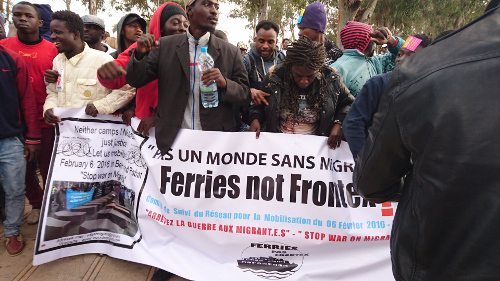 Frontex, agentschap voor Europese grensbewaking, is een militair wapen in de oorlog tegen de migratie. Het beschikt over een arsenaal aan militair materieel en personeel uit alle landen van de Europese Unie en van het Schengengebied. Hiermee wordt middels Rabits (Rapid Border Intervention Teams) zoals onlangs in Griekenland direct ingegrepen daar waar grote groepen migranten plots Europa binnenkomen. Frontex Risico-analyses worden gemaakt om deze flexibiliteit voor te zijn. En zo worden migranten gedwongen gevaarlijkere routes te nemen met alle doden ten gevolge. Maar van enige bijdrage aan de oplossing van het probleem van het vraagstuk is geen sprake. Armoede, corruptie en onderdrukking worden niet aangepakt. Sterker nog, de corrupte staten waar migranten voor vluchten worden gesteund door de Europese staten en Unie. Deze steun is nodig om te komen tot de externalisatie van de grensbewaking. Daar het bewaken van de Middellandse Zee en de landgrenzen van de steeds groter wordende unie nauwelijks te behappen is wordt een buffer buiten de Europese grenzen gevormd. In deze transatielanden dient migratie aangepakt voordat de grens van Europa wordt bereikt. Dat hiermee ook vluchtelingen de kans op asiel ontnomen wordt is meer dan ‘colletaral damage’. Er wordt immers ook voor deze groep geen alternatief geboden voor hun noden en rechten.
Frontex, agentschap voor Europese grensbewaking, is een militair wapen in de oorlog tegen de migratie. Het beschikt over een arsenaal aan militair materieel en personeel uit alle landen van de Europese Unie en van het Schengengebied. Hiermee wordt middels Rabits (Rapid Border Intervention Teams) zoals onlangs in Griekenland direct ingegrepen daar waar grote groepen migranten plots Europa binnenkomen. Frontex Risico-analyses worden gemaakt om deze flexibiliteit voor te zijn. En zo worden migranten gedwongen gevaarlijkere routes te nemen met alle doden ten gevolge. Maar van enige bijdrage aan de oplossing van het probleem van het vraagstuk is geen sprake. Armoede, corruptie en onderdrukking worden niet aangepakt. Sterker nog, de corrupte staten waar migranten voor vluchten worden gesteund door de Europese staten en Unie. Deze steun is nodig om te komen tot de externalisatie van de grensbewaking. Daar het bewaken van de Middellandse Zee en de landgrenzen van de steeds groter wordende unie nauwelijks te behappen is wordt een buffer buiten de Europese grenzen gevormd. In deze transatielanden dient migratie aangepakt voordat de grens van Europa wordt bereikt. Dat hiermee ook vluchtelingen de kans op asiel ontnomen wordt is meer dan ‘colletaral damage’. Er wordt immers ook voor deze groep geen alternatief geboden voor hun noden en rechten.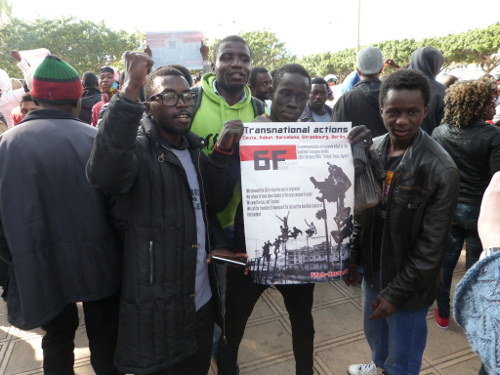 Net als Turkije die nu bijzondere aandacht van de EU krijgt mag Marokko een speciale positie genieten. Het land is zich aan het ontwikkelen van een emigratieland (‘gastarbeiders’) via transitland naar ontvangstland. Het leven van de Sub-Sahara migrant in Marokko is sterk beschreven door Emmanuel Mbolela in zijn boek
Net als Turkije die nu bijzondere aandacht van de EU krijgt mag Marokko een speciale positie genieten. Het land is zich aan het ontwikkelen van een emigratieland (‘gastarbeiders’) via transitland naar ontvangstland. Het leven van de Sub-Sahara migrant in Marokko is sterk beschreven door Emmanuel Mbolela in zijn boek 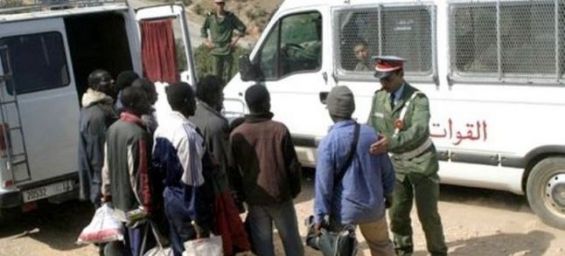
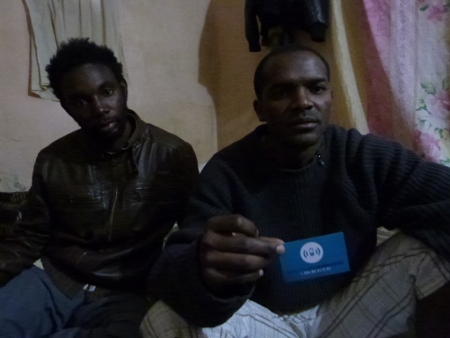
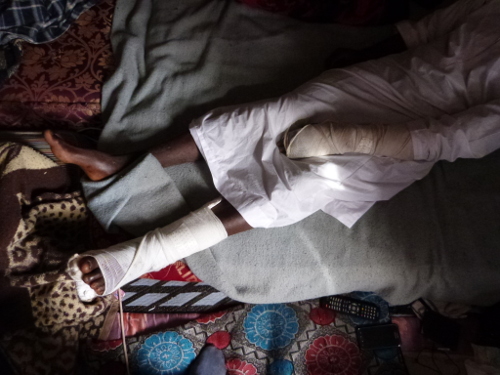
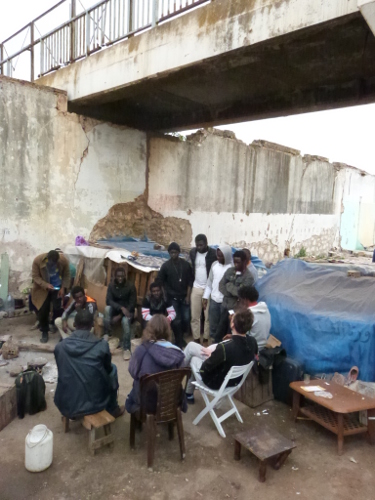
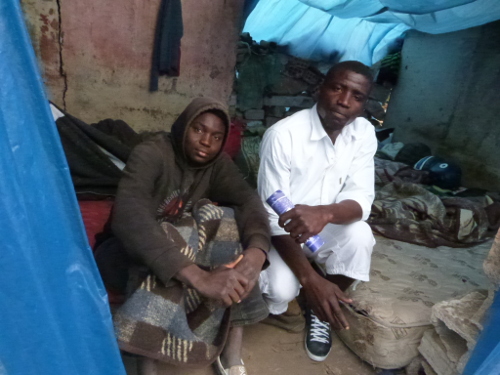
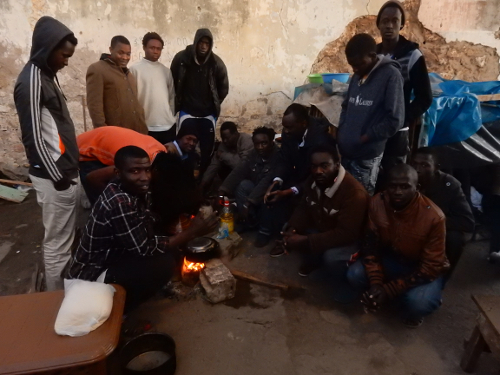
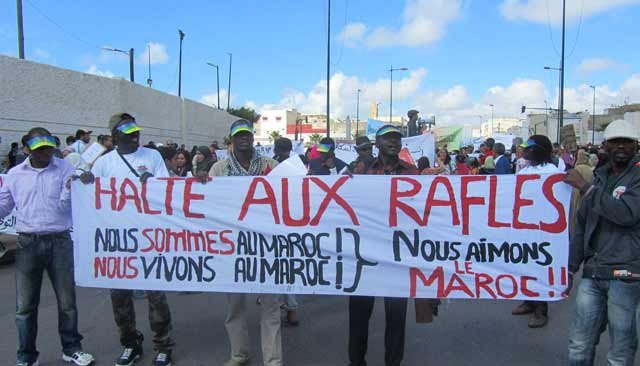
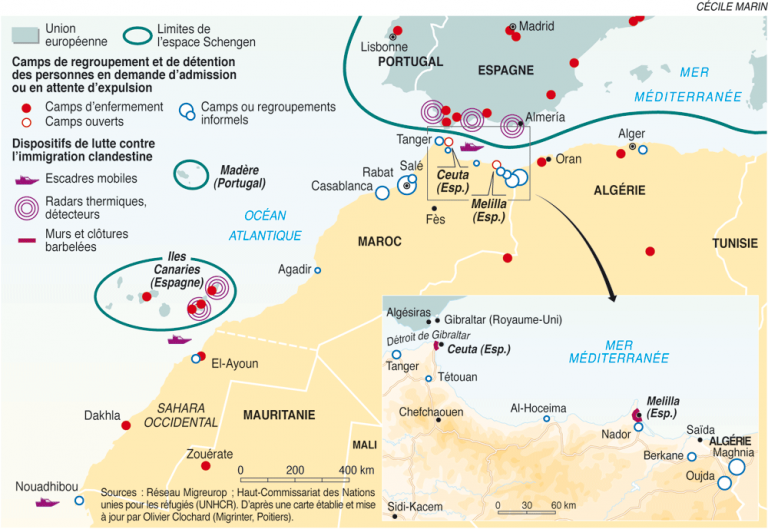
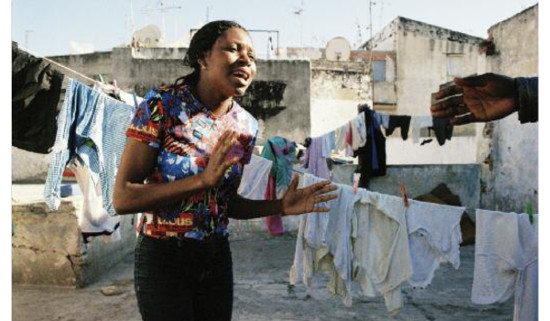
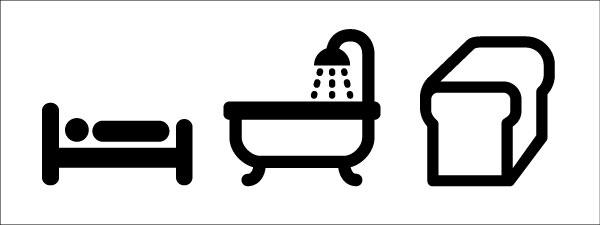
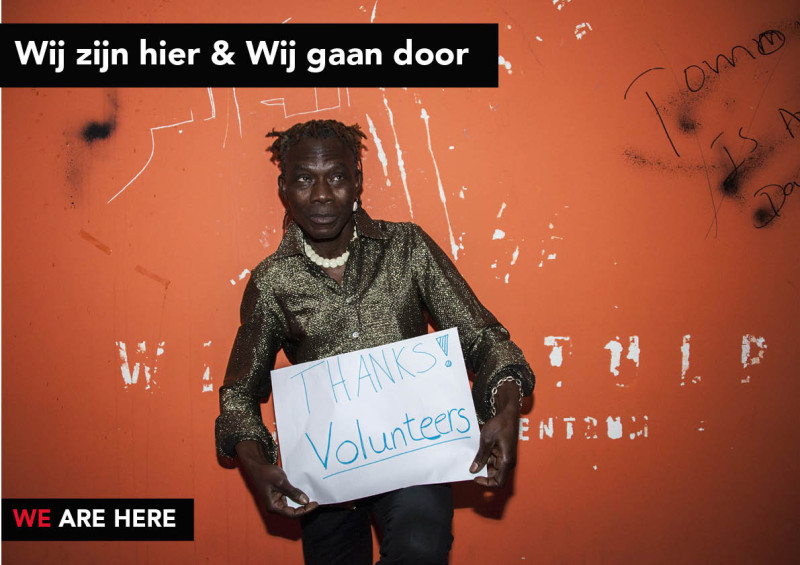
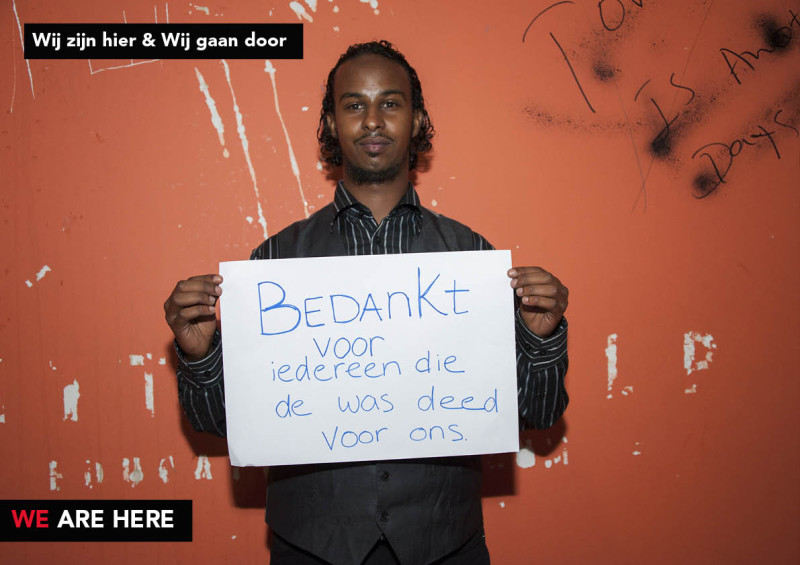
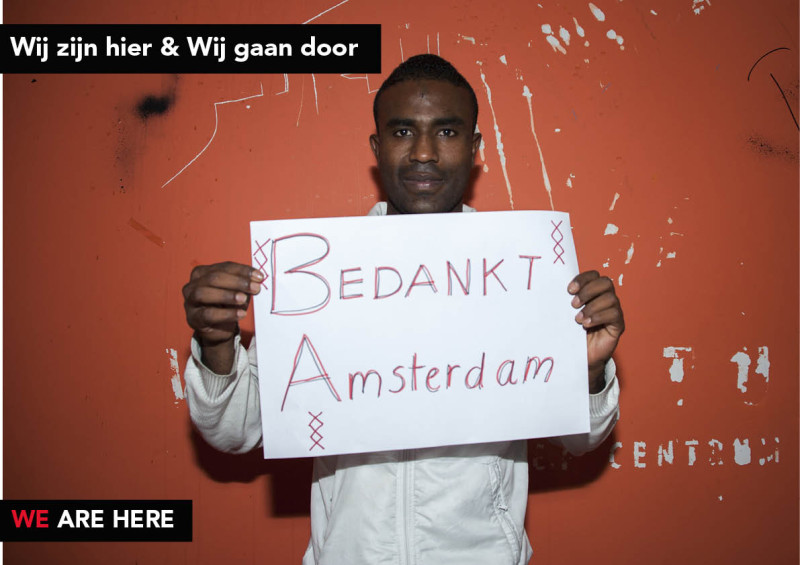
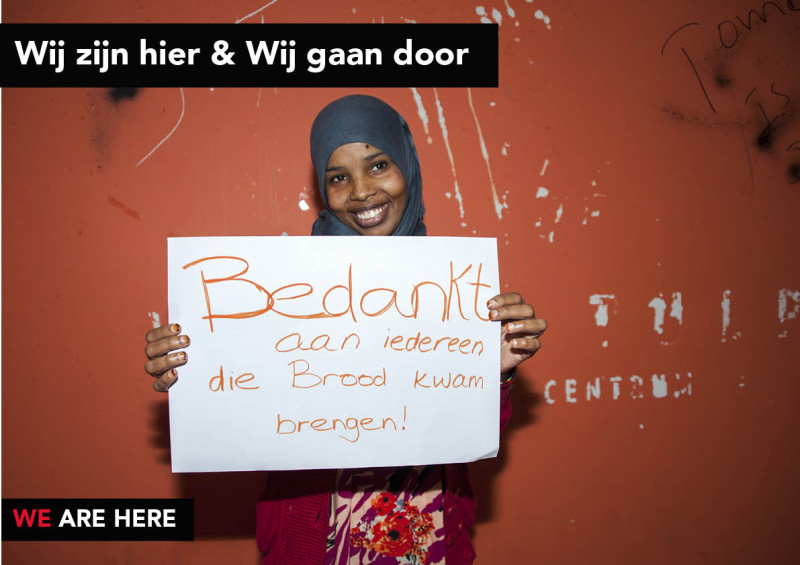
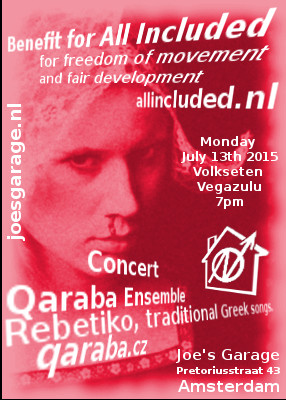 Monday July 13th 2015, Benefit for All Included, for freedom of movement and fair development! Volkseten Vegazulu, 7pm. After the voku, concert Qaraba Ensemble, Rebetiko songs, traditional Greek songs.
Monday July 13th 2015, Benefit for All Included, for freedom of movement and fair development! Volkseten Vegazulu, 7pm. After the voku, concert Qaraba Ensemble, Rebetiko songs, traditional Greek songs.
